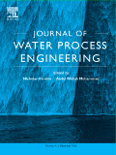
Journal of Water Process Engineering
Scope & Guideline
Pioneering Interdisciplinary Approaches to Water Engineering
Introduction
Aims and Scopes
- Water Treatment Processes:
Research on various physical, chemical, and biological methods for treating water, including advanced oxidation processes, membrane technologies, and electrochemical methods. - Resource Recovery:
Exploration of methods to recover valuable resources, such as nutrients and bioenergy, from wastewater and sludge, promoting circular economy principles. - Pollutant Degradation:
Studies focused on the degradation of emerging contaminants, pharmaceuticals, and other pollutants in water using advanced materials and processes. - Microbial and Bioengineering Approaches:
Investigation into the role of microbial communities in wastewater treatment systems, including bioaugmentation and bioremediation strategies. - Sustainability and Environmental Impact:
Assessment of the sustainability of water treatment technologies, including life cycle analysis and the environmental impact of various treatment methods. - Modeling and Simulation:
Use of computational models to optimize water treatment processes and predict performance outcomes under various operational conditions.
Trending and Emerging
- Electrochemical Water Treatment Technologies:
There is a growing trend towards the use of electrochemical processes for water treatment, including electrocoagulation and electro-Fenton systems, due to their effectiveness and lower environmental impact. - Nanotechnology in Water Treatment:
Research focusing on the application of nanomaterials for water treatment has surged, particularly in the development of photocatalysts and adsorbents to enhance pollutant removal efficiency. - Microalgae Utilization:
The use of microalgae for wastewater treatment and resource recovery is increasingly popular, as it offers dual benefits of pollution reduction and biomass production for biofuels. - Advanced Oxidation Processes (AOPs):
AOPs, including ozonation and Fenton processes, are becoming more prominent for their ability to degrade complex organic pollutants in wastewater. - Machine Learning and AI in Water Management:
There is a significant increase in the application of machine learning and artificial intelligence for predictive modeling, optimizing treatment processes, and managing water resources. - Circular Economy Approaches:
Research is increasingly focusing on integrating circular economy principles into water treatment, emphasizing resource recovery and sustainable practices.
Declining or Waning
- Traditional Coagulation and Flocculation Techniques:
There has been a noticeable decrease in research centered around conventional coagulation methods as newer, more efficient alternatives such as advanced oxidation processes gain traction. - Basic Biological Treatment Systems:
Interest in basic biological treatment methods, such as simple activated sludge systems, appears to be waning in favor of more complex, integrated systems that offer enhanced performance. - Static Water Treatment Technologies:
Research on static or passive water treatment methods is declining as the focus shifts towards dynamic systems that can adapt to varying water quality conditions.
Similar Journals

Water Resources and Industry
Exploring Innovations in Water Science and IndustryWater Resources and Industry, published by Elsevier, stands at the forefront of research in the critical fields of water science and technology, as well as geography, planning, and development. With an impressive 2023 impact factor that places it in the Q1 category for both Geography and Water Science on a global scale, this journal is a vital resource for academics, professionals, and students seeking to advance their understanding of water-related issues impacting industries worldwide. Since its inception in 2013 as an Open Access journal, it has fostered innovative research and practical solutions to challenges in water resource management. Located in the vibrant academic hub of Amsterdam, the journal encourages submissions that cover a broad spectrum of topics, from sustainable practices and policy development to technological advancements in water treatment and distribution. By making its research publicly accessible, Water Resources and Industry not only contributes to scholarly discourse but also empowers stakeholders to implement evidence-based strategies for water sustainability, thereby enhancing its relevance and impact in today's world.

Asian Journal of Water Environment and Pollution
Advancing sustainable solutions for water challenges.Asian Journal of Water Environment and Pollution is a leading academic journal published by IOS PRESS, dedicated to advancing the field of water science and technology, as well as pollution management. With its ISSN 0972-9860 and E-ISSN 1875-8568, this journal serves as a pivotal platform for researchers, professionals, and academics alike who are keen to explore innovative solutions and interdisciplinary approaches toward water-related challenges and environmental issues. Although currently positioned in the Q4 category for both pollution and water science & technology, the journal aims to foster impactful research and discussions that can enhance the understanding and treatment of water pollution. The Asian Journal of Water Environment and Pollution not only plays a crucial role in disseminating knowledge but also encourages the sharing of findings from unique geographic perspectives, particularly from Asia. As the field evolves, this journal is poised to become a vital resource for those looking to contribute to sustainable water management practices and pollution reduction strategies.

Detritus
Fostering collaboration for a greener tomorrow.Detritus, an esteemed open-access journal published by CISA PUBLISHER since 2018, serves as a vital platform for the dissemination of innovative research in the fields of Environmental Chemistry, Environmental Engineering, and Waste Management and Disposal. Based in Padova, Italy, the journal aims to foster scholarly communication and collaboration among researchers, professionals, and students dedicated to advancing our understanding of environmental challenges and solutions. With its open-access model, Detritus ensures that high-quality research is freely available, bridging the information gap within the scientific community. While currently categorized in the Q3 quartile across multiple environmental science disciplines, the journal is poised to further enhance its visibility and impact, contributing significantly to pressing global issues such as waste reduction and sustainable resource management. As the journal continues to evolve, it encourages submissions that advance theory and application in these critical areas.

ACS ES&T Water
Championing high-quality research in water technology.ACS ES&T Water, published by the American Chemical Society, is a leading peer-reviewed journal focused on the interdisciplinary field of water science and technology. Since its inception in 2021, the journal has rapidly established itself as a prominent platform for research, boasting an impressive impact factor and ranking in the Q1 category across various disciplines, including Chemical Engineering, Chemistry, Environmental Chemistry, and Water Science and Technology. With a current Scopus rank of #66 out of 261 in Environmental Science and a remarkable percentile of 74%, ACS ES&T Water is dedicated to advancing the understanding of water-related challenges and solutions through high-quality research. The journal aims to facilitate communication among researchers, professionals, and policymakers by providing open access to innovative studies and methodologies that address critical issues in water resource management and sustainability. Collaborating at the intersection of chemistry and environmental science, this journal is essential for anyone invested in the future of global water security and innovation.

ACS ES&T Engineering
Transforming Research into Real-World Solutions for Global Challenges.ACS ES&T Engineering, published by the American Chemical Society, stands as a leading journal in the realm of Chemical Engineering, Environmental Chemistry, and related fields, with a notable Impact Factor indicative of its scholarly influence. Emerging from 2021 with a vision to address contemporary challenges in engineering and environmental health, this Journal not only covers critical studies in Chemical Engineering but also excels in areas such as Process Chemistry and Technology, aligning with its Q1 status across several categories in 2023. With exceptional rankings in Scopus, including a percentile rank in the 90th for Chemical Health and Safety, it offers a significant platform for researchers, educators, and practitioners to disseminate innovative research and practices. Although the journal maintains a subscription model, its commitment to rigorous peer review and high-quality content ensures that readers gain access to pivotal findings essential for advancing knowledge and practice in a rapidly evolving scientific landscape. For those dedicated to tackling global engineering challenges, ACS ES&T Engineering is an invaluable resource.
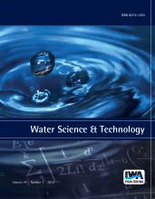
WATER SCIENCE AND TECHNOLOGY
Elevating the discourse on water quality and conservation.WATER SCIENCE AND TECHNOLOGY, published by IWA PUBLISHING, is a leading academic journal dedicated to advancing the field of water science and technology. With a rich history dating back to 1970, the journal provides a platform for innovative research and technological advancements, catering to the vital challenges faced within the realms of environmental engineering and water resource management. As evidenced by its strong ranking in Scopus, where it holds a position of #86 in Water Science and Technology and #77 in Environmental Engineering, the journal exemplifies significant scholarly contributions, reflected in its Q2 quartile status in both categories as of 2023. Although not an open access journal, WATER SCIENCE AND TECHNOLOGY ensures that its articles are widely available to researchers, professionals, and students passionate about sustainable water solutions. With a continued commitment to excellence, this journal plays a crucial role in shaping the discourse surrounding water quality, conservation, and technology innovation, making it an essential resource for all stakeholders in this critical field.

Water Reuse
Transforming Water Futures, One Drop at a Time.Water Reuse is a pioneering journal dedicated to advancing the field of water science and technology, particularly focusing on innovations in water recycling and reuse strategies. Published by IWA Publishing in the United Kingdom, this journal has quickly established itself as a vital resource for researchers, professionals, and students engaged in sustainable water management practices. With an impressive impact factor and a ranking that places it in the top quartile for both Water Science and Technology and Filtration and Separation, Water Reuse offers an open-access platform that fosters the dissemination of high-quality research. Since its inception in 2021, it has garnered attention for its commitment to addressing critical global challenges related to water scarcity and environmental sustainability. The journal provides a crucial forum for the exchange of knowledge and best practices, contributing significantly to the advancement of water reuse methodologies. By encouraging interdisciplinary collaboration and the publication of pioneering studies, Water Reuse is poised to play a central role in shaping the future of water management.
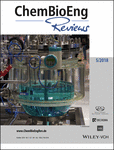
ChemBioEng Reviews
Connecting Academia and Industry in Bioengineering AdvancesChemBioEng Reviews is a premier academic journal dedicated to advancing the fields of biochemistry, bioengineering, and chemical engineering. Published by WILEY-V C H VERLAG GMBH, this journal serves as an essential platform for researchers and professionals seeking to disseminate groundbreaking insights and innovations. With a remarkable impact factor and a solid reputation, it is ranked in the top quartile (Q1) across multiple disciplines, including Biochemistry, Bioengineering, and Industrial and Manufacturing Engineering. The journal's comprehensive scope covers the synthesis, analysis, and application of bioengineered solutions, making it a vital resource for anyone involved in process chemistry and technology. With an unwavering commitment to high-quality scientific discourse from 2014 to 2024, ChemBioEng Reviews is not only pivotal for the academic community but also contributes to industry advancements in filtration, separation processes, and the intersection of chemical and biological engineering.
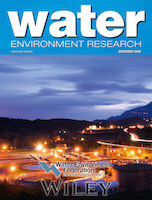
WATER ENVIRONMENT RESEARCH
Transforming knowledge into action for water sustainability.WATER ENVIRONMENT RESEARCH is a leading scholarly journal dedicated to disseminating cutting-edge research in the fields of water science and technology. Published by WILEY, this esteemed journal (ISSN: 1061-4303; E-ISSN: 1554-7531) is renowned for its rigorous peer-reviewed articles that explore critical issues related to ecological modeling, environmental chemistry, pollution, and waste management. Established in 1992 and continuing through 2024, WATER ENVIRONMENT RESEARCH has secured a notable position within its category quartiles, ranking in the Q2 tier for several disciplines, including ecological modeling and water science and technology. It is highly regarded in the Scopus database, holding a rank of #53 out of 261 journals in Environmental Science related to Water Science and Technology, positioning it in the 79th percentile. As it continues to bridge research and practice, this journal serves as an essential resource for researchers, professionals, and students striving to advance knowledge and foster sustainable solutions within the water environment sector.
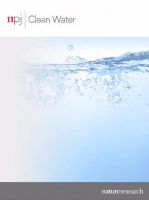
npj Clean Water
Connecting researchers to tackle water issues.npj Clean Water, published by NATURE PORTFOLIO, is a premier open-access journal dedicated to advancing the field of water science and technology. Since its launch in 2018, this innovative publication has quickly established itself as a leading platform for original research and policy discussions concerning clean water access and quality. With an impressive impact factor and categorized in the Q1 Quartile across multiple environmental science disciplines—including management, monitoring, pollution, and waste management—npj Clean Water stands out for its rigorous peer-review process and commitment to disseminating high-quality research. Researchers, professionals, and students involved in water-related challenges will find invaluable insights that address critical environmental issues and promote sustainable practices. Access to articles is freely available, encouraging global collaboration and knowledge sharing within the water sector. This journal embodies a significant step towards achieving innovation and policy advancements in the pursuit of a cleaner, safer water future.